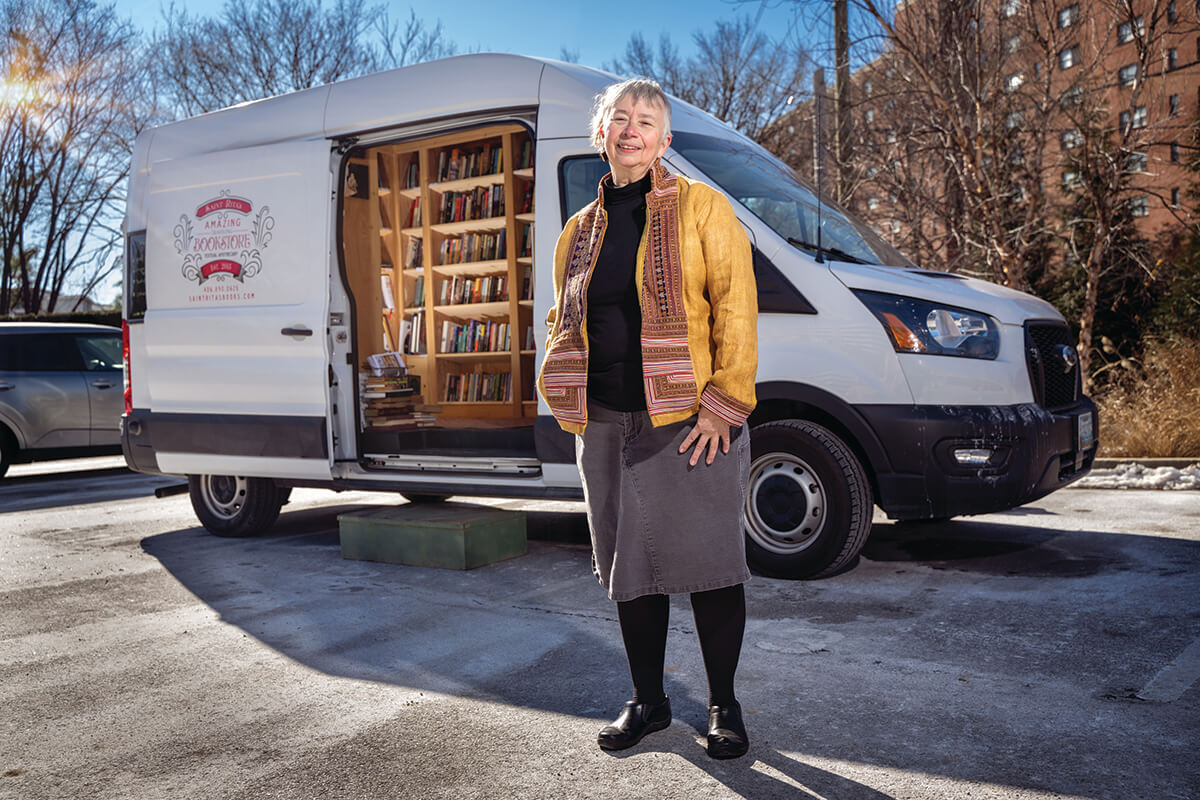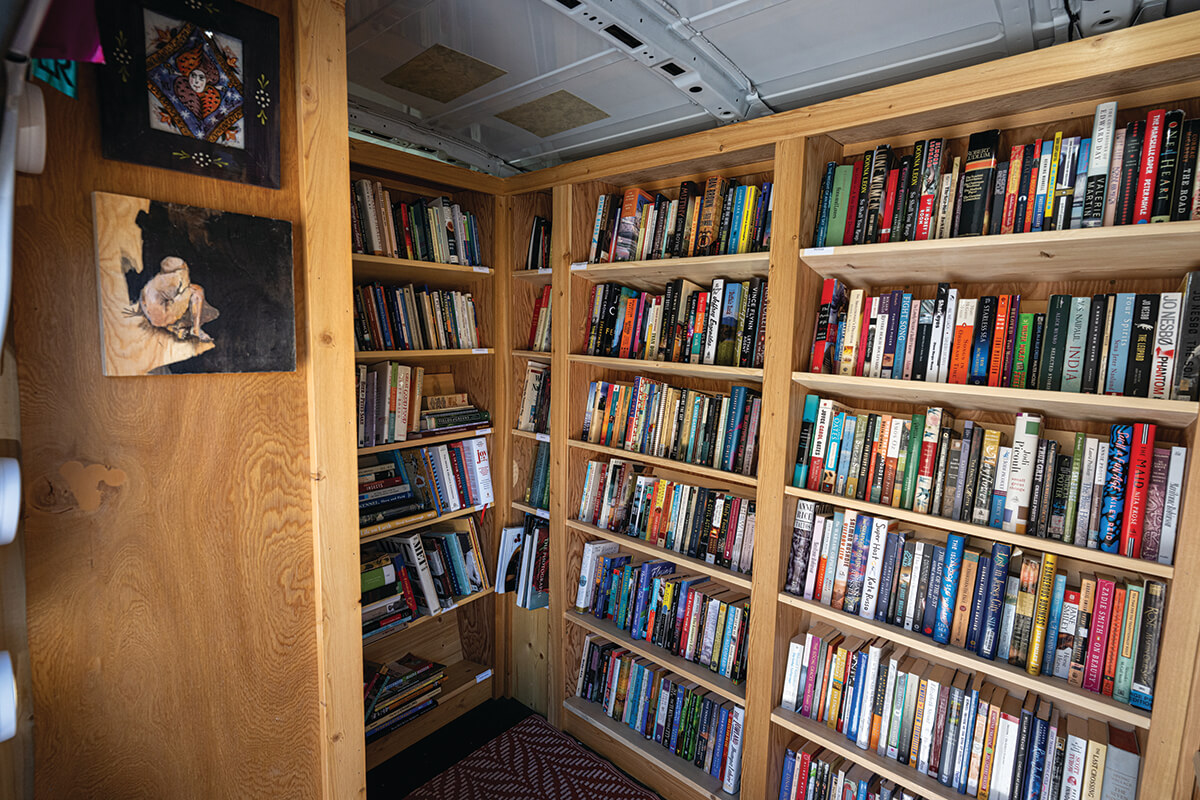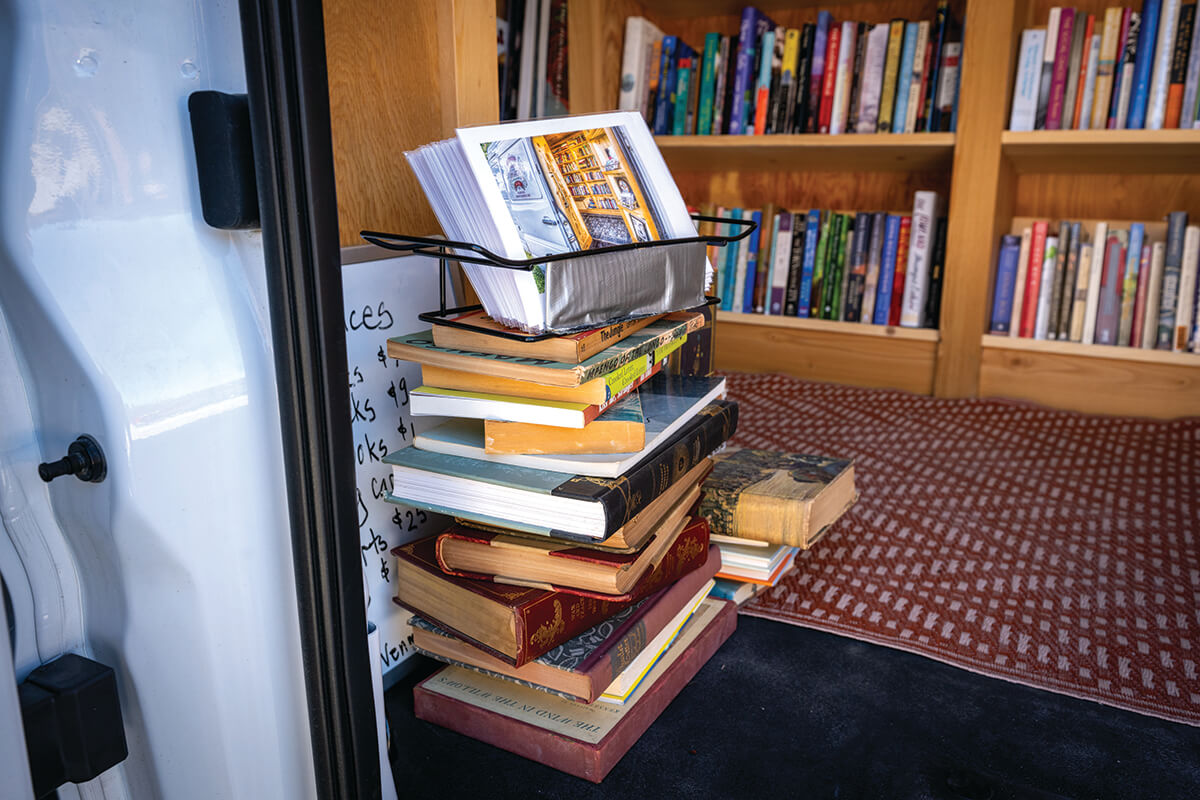Arts & Culture
The Traveling Bookstore on Wheels That Found a Home Base in Baltimore
Creative force Rita Collins left Baltimore after graduating high school. Now, after exploring the world and launching a mobile book van in Montana, she’s spreading her love of reading in the city she left behind.

Step right up, readers and book lovers. Saint Rita’s Amazing Traveling Bookstore and Textual Apothecary, quite likely the only bookstore that crisscrosses the country, has relocated to Charm City.
This bookstore on wheels has logged more than 100,000 miles through 44 states in the last decade, putting thousands of used books in the hands of readers. Last fall, it moved its home base to Baltimore from the tiny town of Eureka, Montana (population 1,533).
The store’s purveyor, Rita Collins, 73, is a Baltimore native who hasn’t lived here since she graduated from Woodlawn High School in 1969. Now she’s rediscovering the city she left behind to go adventuring all over the U.S. and the world.
You can’t miss her white bookstore van: It’s 19-feet long with that sizable name in colorful curlicue font on the side. Inside, enter a hobbit home of books where children can sit cross-legged on a cozy rug and read whatever they find on the lower shelves. Overall, about 800 volumes sit on shelves pitched at a 15-degree angle—so the books don’t topple on the road—while overhead lights illuminate fiction, nonfiction, poetry, regional books, cookbooks, kids’ books, plus postcards, greeting cards, and artwork.
“I like to think anybody could imagine how much fun this could be,” Collins says from the community room of her new home at Roland Park Place. “If you like people, you like to drive, and you like books—those are the three things you need.”
And she loves all three.

Wherever Saint Rita’s stops, Collins finds that people still enjoy the feel of a book in their hands. Despite e-books and audiobooks, print books remain the most popular nationwide, accounting for 63 percent of book sales in the U.S. last year, according to the data-gathering platform Statista.
Mobile bookstores remain rare, however. Of 291 independent bookstores that opened in the U.S. in 2023, only nine were mobile, according to the American Booksellers Association. Mobile bookstores may be on wheels, but generally they stay in one city or geographic area, unlike Saint Rita’s, which is a genuine traveling bookstore—going anywhere and everywhere over the years.
A college dropout who went back to school to earn a doctorate, Collins has been a teacher, an artist, and a writer. At 5 feet, 4 inches, with a round face topped by a wisp of bangs and her graying hair often in pigtails or braids, she is a spritely presence brimming with creativity and curiosity. Her interests include travel, visual arts, quilting, letterpress, bookbinding, and that Baltimore specialty, crankies.
She made her first Baltimore art sale at a gallery fundraiser not even a month after returning here: a framed set of white cotton underwear stamped with the message “UNKNOT THOSE KNICKERS.” She’s done letterpress on bubble wrap and strips of old film, made skirts out of recycled cassette tapes, and created a quilt with quotations from a volatile board of health meeting during the pandemic in small-town Montana.
Creativity? “That’s my thing,” she says. “Actually, it’s everybody’s thing, but I just do it.”
Collins was Rita Chalmers when she grew up here, the middle of the five children of Margaret and William Chalmers. Her father attended Baltimore Polytechnic Institute and founded Yankee Engineering in Baltimore in 1946. The family lived in Catonsville and she grew up an avid reader.
Her mother would regularly take her and her siblings to the local Baltimore County Public Library branch for bags of books. “It’s just so ingrained in me,” she said. “Like, if I have 10 minutes, where’s something I can read?”
After initially dropping out of college, she headed to San Francisco. Later, she attended St. John’s College in Annapolis, a choice that spurred several life changes. Renowned for its Great Books curriculum, St. John’s was a good fit for Collins, whose questioning nature found a home there.
“I think of it as a school for readers,” she says.
She also found the man who became her husband, a premed student whose education took them to several states while Collins earned a master’s degree in special education and later a doctorate in adult education.
When the couple moved to Eureka, she taught at the area’s not-so-nearby community college. But things weren’t working. She had a 70-mile commute to her job. The marriage was coming apart. And then 9/11 prompted another life change, she says: “I was just like, you know, I’m looking elsewhere.”
For two years, elsewhere was Romania, where she taught English. Next, she spent six years teaching at Masaryk University in Brno, in the Czech Republic. Even in her Eastern European classrooms, Collins remained opened to new possibilities. What started as a simple classroom songfest in Brno, for example, turned into a student choral group that won awards and traveled to other countries.
“In the beginning, we just sang for fun, and then because Rita is Rita, she said we should sing for someone,” says Jana Pestova, then a Collins’ student and now vice principal at an elementary school in the Czech Republic. “She’s inspiring. She’s my role model,” Pestova adds. “She’s just being herself, not apologizing.”
In general, being Rita Collins means having an idea, being told it might not work, and then making it work anyway. By 2011, she was ready to come back to the U.S. and be around familiar people and places again.
“I turned 60 and I was divorced,” she says with a smile. She pondered opening a bookstore in Eureka, a town she’d grown to love.
Not enough foot traffic in such a small place, however, she learned. So, if readers wouldn’t come to the bookstore, she decided to put the bookstores on wheels and bring it to readers. It was a wild idea, with few models for such a thing.
“It sounded like a Rita idea to me,” says Lynda Young, a fellow quilter and walking partner from Eureka. “She was always the first to try something.”
Collins learned of one traveling bookstore. It was in Wales: Dylan’s Mobile Book Bus, which started in 2010 and traveled all over the United Kingdom. Collins wrote overseas to ask for tips from the owner, Jeff Towns, who named his bus for Welsh poet Dylan Thomas.
Towns gave her the only advice he could think of. “I just said, ‘Find a bus, fill it with interesting books and hit the road,’” he wrote recently in an email from his home in Swansea, on the south coast of Wales.
So, Collins found a 2004 Dodge Sprinter with about 70,000 miles on the odometer, tall enough to stand in. Then she enlisted a friend to build those angled shelves.
Next, that name: Saint Rita’s Amazing Traveling Bookstore and Textual Apothecary. The “Rita” is not for herself, but an homage to St. Rita, a 14th century Italian known as the patroness of impossible causes—an apt choice for a far-fetched plan to put a bookstore on the road.
She wanted a long name, reminiscent of an old-time traveling medicine show. “Like a magical thing,” she says, “a name that’s long and complicated the way those names were.”
Why “textual apothecary”? “Reading can make you feel better,” Collins explains. “If you have the right book, it will do the job.”
Her first customers were in Eureka. But Collins doesn’t think small, and she soon began hauling books to readers in faraway places like Utah and California, and further still to New York City, Arkansas, and West Virginia. By 2022, her expeditions were featured on The Kelly Clarkson Show.
“IT SOUNDED LIKE A RITA IDEA TO ME… SHE WAS ALWAYS THE FIRST TO TRY SOMETHING.”
Saint Rita’s is “more than a bookstore,” says Collins’ friend Shirley Jacobs from Eureka. “It was carved out of Rita’s brain. It’s the best thing to do with your life, to create something that isn’t there.”
Jacobs, 87, went along to several bookstore stops in Washington state and Montana. While Collins sold books, Jacobs played accordion.
Collins’ inventory comes almost exclusively from donations, although sometimes she visits thrift shops or yard sales. Given her low overhead—no rent, no marketing costs, no inventory expense—she charges $7 for paperbacks and $9 for hard covers. Kids’ books are always $1. If someone comes in and finds a signed first edition of, say, an Anne Tyler book, it’s still $9, even if someone can re-sell it for far more.
“I don’t want to have to be online doing the research,” she says. “I want to be able to sell books and have conversations.”

The bookstore pays for itself most of the time. Because it travels for only part of the year, Collins doesn’t expect to make a living from it. The rest of the time she travels without the bookstore; this winter she visited Vietnam and the Czech Republic.
She doesn’t sleep in Saint Rita’s, although she could. Instead, she’s developed a network of people to stay with at almost all her stops. Last spring, she was on the road for five weeks and never booked a hotel.
“I stay with friends, and friends of friends, and sometimes it’s really removed,” she says.
Her bookstore journeys—up to seven weeks with as many as 20 scheduled stops—are mostly pleasure. (Her schedule can be found, here.)
But she’s had a few low points: breakdowns and bad weather that cause a sudden change of plans. In Spring 2023, she needed the van’s engine repaired just when she was scheduled to leave on a six-week trip from Montana to Mississippi. In that instance, she and her plucky traveling partner, Czech native Yvetta Fendrichcova, packed books into Collins’ day-to-day vehicle, her Subaru Crosstrek, and then unloaded and re-loaded at every stop. With the passenger seat pushed forward to accommodate books and luggage, her helper had to cram into the car with her feet on yet another box.
Once, a different friend traveling along started crying when the van blew a tire in South Dakota. “You either have to have a really good person or it’s better not to have anyone,” Collins notes.
A diesel spill in Idaho last spring and another fuel leak in California a few weeks later led to a major decision. She’d been traveling with the bookstore for nine years and 110,000 miles. The Sprinter van was 20 years old. She was 72.
“Either I decide I don’t want to do the business anymore or I get another van.” she recalls. “It was a big turning point.”
She didn’t hesitate. Enter her current 2023 Ford Transit 250—taller, longer, and wider than the original Saint Rita’s, with room for more books and the promise of new adventures.
Saint Rita’s Ford Transit/Baltimore era started this past December with a bookstore gig at the pop-up Birch and Pen Holiday Market in Mount Vernon and another at Peabody Heights Brewery. This spring, Collins launches a seven-week Western trip that will include the Los Angeles Times Festival of Books.
Collins doesn’t plan to give up her magical Saint Rita’s anytime soon. Still, five years ago she began making plans for what she calls “sensible aging.”
“I really couldn’t imagine aging comfortably in Eureka,” she says, and began looking around on bookstore jaunts for a nonprofit retirement community that would allow her to walk to shops or a library—with room to park the bookstore.
Roland Park Place fit all her criteria. She waited a year and a half for an apartment to come open, and her delight in meeting people is paying dividends.
On a walk down the hall just three weeks after she moved in last October, she already knew several people by name. And neighbors were knocking on her door with bags of books.